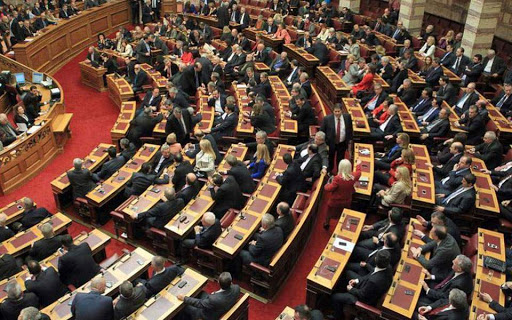Didn’t someone mention catharsis?

Let me begin by telling you about Georgios, a postgraduate student in Berlin. When he was younger, he was very athletic and he became a member of a Greek national sports team. Last week, he went to see his professor, Helmut, seeking advice. He’d always expected to pursue a career outside Greece, because of the crisis. He is finishing his doctorate this summer and he hopes to be a professor himself one day. However, he is now faced with a dilemma.
He explained that before the crisis, there was a law in Greece that gave the right to successful athletes, such as himself, to be offered a post in the public sector. This was annulled at the behest of the troika. But now the government has reactivated the law and Georgios has received an official letter offering him a position in one of two government ministries or in a university administration. The letter requires him to decide soon whether or not to accept the offer. And, strange as it may seem, the job would begin in September, just weeks after the general election.
Like many students, Georgios will find it difficult to obtain an academic post in Europe or the US. The job offer from Athens offers him security and a return home. What should he do? he asked Helmut.
Helmut was aghast. How does being an athlete qualify you to be a public servant? One of the job offers is for a post in the Ministry of Foreign Affairs. Georgios has no expertise in foreign affairs. Helmut had understood from Angela Merkel that the tough conditionalities of the bailout programs had obliged Greece to end the practices of offering state favors to targeted groups and had prompted a “catharsis” of politics.
Sadly, though the identity of the student has been changed here, the story is true. It came amid the frenzy of handouts and favors reported in the Greek press in this pre-election period.
In this era of globalization, I always find it amazing that our politicians speak and act as if no one outside is listening, that they can keep a secret with their domestic audience.
Of course, the reality here is that successive Greek governments sustained such an absurd law, abusing the public sector as if it was a cash cow to fund the re-election of the party in power. They were only stopped by the troika. The irony today is that SYRIZA, which came to power attacking the corruption of the “party state” in the most vitriolic terms, has succumbed to the crimes it once lambasted. Where is the catharsis now?
In truth, Greece’s creditors may not be listening or may not be interested in Georgios’ story. Yannis Stournaras has warned that the government’s handouts pose serious risk that Greece will overshoot its primary budget targets, agreed as part of last August’s post-bailout deal. European Union institutions have also expressed their concerns. But no other EU government criticized the pre-election measures.
Georgios’ case goes to the heart of the failings of how the Greek crisis has been managed, however. The EU – and, earlier, the International Monetary Fund – insisted on a savage program of austerity. This prioritized the correction of government finances. A set of structural reforms have sought to liberalize the domestic market, with limited effect.
Less attention has been paid to Greece’s institutional failings. A set of often clumsy reforms were imposed, but the record of implementation has, in any event, been very patchy. The basic modus operandi of the public administration has barely changed; the administrative culture has remained largely resilient.
Europe has rescued itself from the Greek crisis. Last August’s deal, and Greece’s economic progress, should keep the country out of the international headlines as far as the eurozone is concerned. But, the opportunity for deeper institutional reforms in Athens has been missed. So perhaps European governments will continue to turn a blind eye to Georgios’ story. Just as it seemed safer not to ask too many questions before the crisis, it may appear so again.
But there are risks here for Greece’s long-term interests. The failure to make real improvements to the efficiency and effectiveness of Greece’s public institutions – and to their abuse by politicians – threatens to see Greece equated with its Balkan or Central European neighbors.
For while, on a list of international indicators, countries like Spain or Portugal have been on a path of convergence with France and Germany, in terms of the quality of their public institutions, Greece has instead mirrored the inefficiencies and the sleaziness of Bulgaria, Romania and others. While French President Emmanuel Macron talks of “deepening” the EU, a new dividing line appears that cuts off Southeast Europe as a lost cause, unable to live with the demands of delivering the required domestic governance.
Europe has voted in a climate of conflict and new dividing lines. But the European agenda will likely move on. This is a year in which Greeks can reflect on Georgios’ story and ponder where it belongs and what the country needs.
Kevin Featherstone is Eleftherios Venizelos professor of Contemporary Greek Studies and director of the Hellenic Observatory at the London School of Economics.





